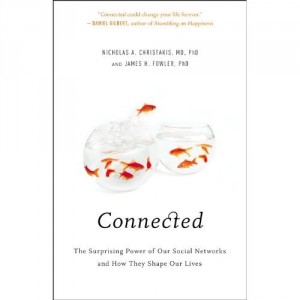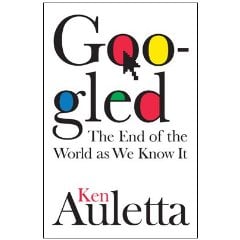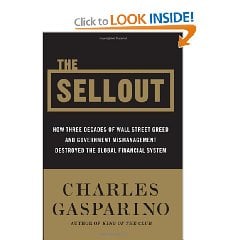Spent some time in a REAL bookstore last week. I’m daydreaming of a Nook…
Connected: The Surprising Power of Networks and How They Shape Our Lives
 This looks particularly intelligent. Here’s a PDF excerpt.
This looks particularly intelligent. Here’s a PDF excerpt.
Publishers Weekly says: Harvard professor and health care policy specialist Christakis (Death Foretold: Prophecy and Prognosis in Medical Care) became interested in social connectivity when observing that the mortality rate of spouses spike after a partner passes away. Christakis sought out a collaboration with Fowler, a health systems and political scientist, and together they compare topology (the hows of a given structure) across different social networks to better explain how participation and positioning enhances the effectiveness of an individual, and why the “whole” of a network is “greater than the sum of its parts.” Five basic rules describe the relationship between individuals and their networks—including mutual adaptation, the influence of friends and friends’ friends, the network’s “life of its own”—but the results do more than promote the good of the group: they also spread contagions; create “epidemics” of obesity, smoking and substance abuse; disseminate fads and markets; alter voting patterns; and more. A thorough but popular take on a complex phenomenon, this volume offers an entertaining guide to the mechanics and importance of human networking. 13 b/w illustrations, 8-page color insert.
Free: The Future of a Radical Price
 Malcolm Gladwell wrote aboutChris Anderson’s book this past summer. Here’s the Publishers Weekly take:
Malcolm Gladwell wrote aboutChris Anderson’s book this past summer. Here’s the Publishers Weekly take:
In the digital marketplace, the most effective price is no price at all, argues Anderson (The Long Tail). He illustrates how savvy businesses are raking it in with indirect routes from product to revenue with such models as cross-subsidies (giving away a DVR to sell cable service) and freemiums (offering Flickr for free while selling the superior FlickrPro to serious users). New media models have allowed successes like Obama’s campaign billboards on Xbox Live, Webkinz dolls and Radiohead’s name-your-own-price experiment with its latest album. A generational and global shift is at play—those below 30 won’t pay for information, knowing it will be available somewhere for free, and in China, piracy accounts for about 95% of music consumption—to the delight of artists and labels, who profit off free publicity through concerts and merchandising. Anderson provides a thorough overview of the history of pricing and commerce, the mental transaction costs that differentiate zero and any other price into two entirely different markets, the psychology of digital piracy and the open-source war between Microsoft and Linux. As in Anderson’s previous book, the thought-provoking material is matched by a delivery that is nothing short of scintillating.
Googled: The End of the World As We Know It
 Before I went to the bookstore I heard the author of Googled interviewed by Fresh Air’s Terry Gross.
Before I went to the bookstore I heard the author of Googled interviewed by Fresh Air’s Terry Gross.
From Publishers Weekly: Two Googles emerge in this savvy profile of the Internet search octopus. The first is the actual company, with its mixture of business acumen and naïve idealism (Don’t Be Evil is the corporate slogan); its brilliant engineering feats and grad-students-at-play company culture; its geek founders, Sergey Brin and Larry Page, two billionaires who imbibe their anti-establishment rectitude straight from Burning Man; its pseudo-altruistic quest to offer all the world’s information for free while selling all the world’s advertising at a hefty profit. The second Google is a monstrous metaphor for all the creative destruction that the Internet has wrought on the crumbling titans of old media, who find themselves desperately wondering how they will make money off of news, music, video and books now that people can Google up all these things without paying a dime. The first Google makes for a standard-issue tech-industry grunge-to-riches business story, its main entertainment value being Brin’s and Page’s comical lack of social graces. But New Yorker columnist Auletta (World War 3.0: Microsoft and Its Enemies) makes the second Google a starting point for a sharp and probing analysis of the apocalyptic upheavals in the media and entertainment industries.
The Sellout: How Three Decades of Wall Street Greed and Government Mismanagement Destroyed the Global Financial System
 Jim Gobetz offers this review:
Jim Gobetz offers this review:
The book provides a very in depth history of the events and conditions that led up to the current economic situation. The profiles of the people involved are evidence of Mr. Gasparino’s inside access to these individuals, and illustrate his skill as an investigative journalist.
The book begins with an historical look at events as far back as the 1970’s that in Mr. Gasparino’s opinion led to the corporate culture that would eventually result in an inability of the entities involved in the current debacle to accurately assess risk. As it progresses towards the present it gets very detailed and again points up Mr. Gasparino’s research and tenacity in interviewing the participants in the events he portrays. He offers a good portrait of the players in the events and is occasionally brutal in describing the personalities of these individuals. I imagine it will be very difficult for him to get any face time with some of these folks who get a particularly harsh treatment from him. My own experience in the business biases me towards the position of having little sympathy towards those individuals. Corporate big shots with huge egos and more money than sense deserve the harsh treatment Mr. Gasparino metes out to them.
The book does go into much detail that folks familiar with the corporate workings of Wall Street, and the market, will find a bit simplistic. I guess this is due to a desire to not scare off the lay reader with wonkish jargon. Also there is a lot of repetition of events and explanations that I found somewhat annoying. The book is certainly long enough that it didn’t require what I saw as filler. This may be a function of the editor rather than the author but there was enough of it to rise to the level of notice.
If you are looking for an in depth illustration of the events and personalities involved in the current economic crisis, you’ll certainly find it here. If you’re looking for Hemmingway and a perfect execution of authoring and editing this book will come up more than a bit short. If you are looking for a hero you won’t find it here, there were no heroes in these events, and the book does not have a happy ending as the events are still playing out.
As a serious wonk who can’t get enough of this stuff I am able to put aside the blemishes and feast on the detail. If you are in the same camp you will find an enjoyable read here, if not it may be overly detailed and you may get mired in those details and bog down.
Five Minds for the Future
 Publishers Weekly: Psychologist, author and Harvard professor Gardner (Multiple Intelligences: New Horizons) has put together a thought-provoking, visionary attempt to delineate the kinds of mental abilities (“minds”) that will be critical to success in a 21st century landscape of accelerating change and information overload. Gardner’s five minds-disciplined, synthesizing, creating, respectful and ethical-are not personality types, but ways of thinking available to anyone who invests the time and effort to cultivate them: “how we should use our minds.” In presenting his “values enterprise,” Gardner uses a variety of explanatory models, from developmental psychology to group dynamics, demonstrating their utility not just for individual development, but for tangible success in a full range of human endeavors, including education, business, science, art, politics and engineering. A tall order for a single work, Gardner avoids overly-technical arguments as well as breezy generalizations, putting to fine use his twenty years experience as a cognitive science researcher, author and educator, and proving his world-class reputation well-earned. Though specialists might wish Gardner dug a bit more into the research, most readers will find the book lively and engaging, like the fascinating lectures of a seasoned, beloved prof.
Publishers Weekly: Psychologist, author and Harvard professor Gardner (Multiple Intelligences: New Horizons) has put together a thought-provoking, visionary attempt to delineate the kinds of mental abilities (“minds”) that will be critical to success in a 21st century landscape of accelerating change and information overload. Gardner’s five minds-disciplined, synthesizing, creating, respectful and ethical-are not personality types, but ways of thinking available to anyone who invests the time and effort to cultivate them: “how we should use our minds.” In presenting his “values enterprise,” Gardner uses a variety of explanatory models, from developmental psychology to group dynamics, demonstrating their utility not just for individual development, but for tangible success in a full range of human endeavors, including education, business, science, art, politics and engineering. A tall order for a single work, Gardner avoids overly-technical arguments as well as breezy generalizations, putting to fine use his twenty years experience as a cognitive science researcher, author and educator, and proving his world-class reputation well-earned. Though specialists might wish Gardner dug a bit more into the research, most readers will find the book lively and engaging, like the fascinating lectures of a seasoned, beloved prof.
The Kids are All Right: A Memoir
 Publishers Weekly: In a memoir rendered eerily dry and scattered by emotional distance, the four Welch children, orphaned in their youth in the mid-1980s, recount by turns their memories and impressions of that painful time. Growing up in an affluent community of Bedford, N.Y., to a glamorous mother and a handsome father who was the head of an oil company, the children—Amanda (born in 1965), Liz (1969), Dan (1971) and Diana (1977)—were devastated first by the sudden death of their father in a car accident in 1983, followed by their mother three and a half years later after a long, wrenching bout with cancer. The two eldest girls, teenagers at the time and initiated into the drug and rock and roll scene, remember most vividly the details of that era when their mother, already diagnosed with uterine cancer, discovered that their father left a large debt; the family had to consolidate by selling their big house and their horses. After their mother died, the children were put in the care of others, mostly with disastrous consequences, especially for Diana, farmed out to a controlling neighbor family who initially hoped to adopt her, but decide otherwise after she hit her awkward teens. Each struggled to forge an identity within harrowing circumstances, with numbing results. Dan became a troublemaker and bounced out of boarding school, while Amanda, heavily into drugs, dropped out of NYU, and Liz traveled to get out of the house.
Publishers Weekly: In a memoir rendered eerily dry and scattered by emotional distance, the four Welch children, orphaned in their youth in the mid-1980s, recount by turns their memories and impressions of that painful time. Growing up in an affluent community of Bedford, N.Y., to a glamorous mother and a handsome father who was the head of an oil company, the children—Amanda (born in 1965), Liz (1969), Dan (1971) and Diana (1977)—were devastated first by the sudden death of their father in a car accident in 1983, followed by their mother three and a half years later after a long, wrenching bout with cancer. The two eldest girls, teenagers at the time and initiated into the drug and rock and roll scene, remember most vividly the details of that era when their mother, already diagnosed with uterine cancer, discovered that their father left a large debt; the family had to consolidate by selling their big house and their horses. After their mother died, the children were put in the care of others, mostly with disastrous consequences, especially for Diana, farmed out to a controlling neighbor family who initially hoped to adopt her, but decide otherwise after she hit her awkward teens. Each struggled to forge an identity within harrowing circumstances, with numbing results. Dan became a troublemaker and bounced out of boarding school, while Amanda, heavily into drugs, dropped out of NYU, and Liz traveled to get out of the house.